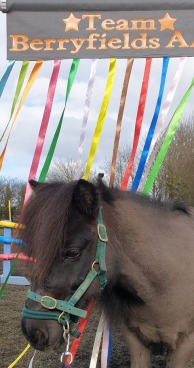
Equine Facilitated Learning
What is Equine Facilitated Learning (EFL) ?
This intervention has grown in popularity over the last decade and many different health professionals now work alongside horses in order to help their clients.
Equine Facilitated Learning (EFL) involves non-riding interactions between humans & horses from the ground. The horse is generally considered the teacher and a human facilitator is there to help guide the participants on a journey of learning & understanding
Being with equines can teach us much about relationships and successful communication and getting to know individual horses through a range of activities such as grooming, haltering, leading and lunging, can help us become more aware of our own mental and physical processes.
Paying attention to our body language and physical sensations, may lead to a better understanding of our thoughts, feelings and behaviours.
We also run sessions for individuals, pairs, groups, families and within educational settings.
Why choose Equine Facilitated Learning?
Horses don’t criticise, they are non-judgemental, sensitive, and responsive to intent. They can detect emotions and usually provide immediate and honest feedback. Most importantly horses don’t lie because they don't separate how they feel from how they act. Hence EFL offers a unique opportunity to explore behavioural issues in a non-confrontational way, encouraging the development of verbal and non-verbal communication skills. Opportunities for powerful metaphoric learning often arise and as self-awareness develops we ‘grow’ as individuals, finding it easier to change our perception of ‘self’ and of ‘others’.
When can it help?
Clients who attend sessions often have low self-esteem or lack confidence. They may find relationships and social interaction difficult, or feel anxious and depressed.
Being with horses has many healing benefits and Equine Facilitated Learning has something to offer anyone who wants to learn more about themselves and their relationships. Building a successful relationship with a horse relies largely on the development of mutual trust and respect but skills such as concentration, observation and curiosity are also necessary.
Practitioners may choose activities to encourage these skills, including how to manage and care for a large animal. This can be empowering, helping to improve confidence and self-esteem. Horses also offer affection and ‘connection’ through touch and stroking, both of which have been shown to be therapeutic in the treatment of anxiety and depression.
The sessions provide individuals or a group the opportunity to become engaged in situations that require interaction with the horse and participants, and for the participants to reflect on these experiences. The overall intent is to create opportunities for participant self-development and to internalize this awareness within the sessions and generalize it to other life situation
Benefits of EFL:
- Increased self-awareness and self confidence
- Support emotional and behavioural growth
- Support Social and Emotional Learning Competencies
- Improved educational outcomes
- Personal self-development
- Improved communication skills and teamwork skills
Our Therapy Equines
At our yard all equine activities are based on 'ground work' with the ponies and does not involve riding.
All of the ponies used in equine activities at the Centre have been specifically chosen for their character and temperament.
Equine Assisted Learning has some special benefits for all those involved including:
- Equine Facilitated Learning utilises the unique relationship that exists between equines and people to beneficial effect.
- The horse as a 'prey' animal finds security in the herd and as such will 'bond' with people and seek to be led
- Equine assisted learning can be used with people who have no previous experience of equines and need not involve riding.
- The horse's behaviour will 'mirror' that of the person working with it and so responds to human body language, most especially working on the basis of mutual respect and trust.


